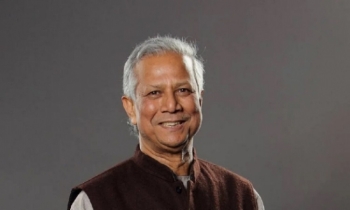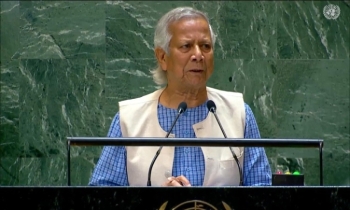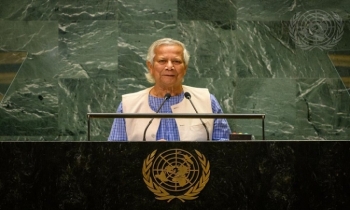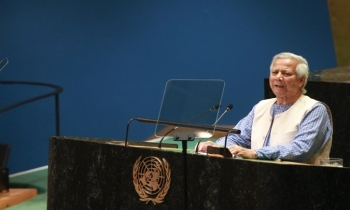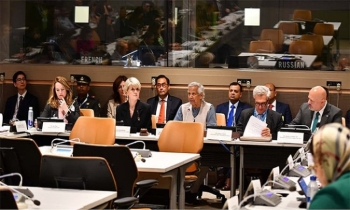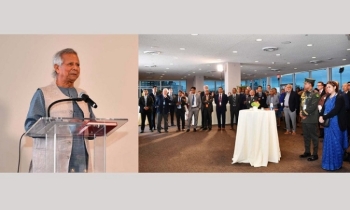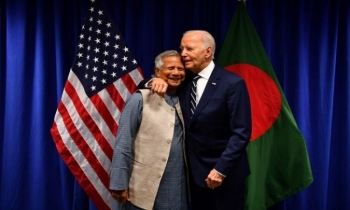Relocation of war expenditure could ensure better world environment: PM
BI Desk || BusinessInsider
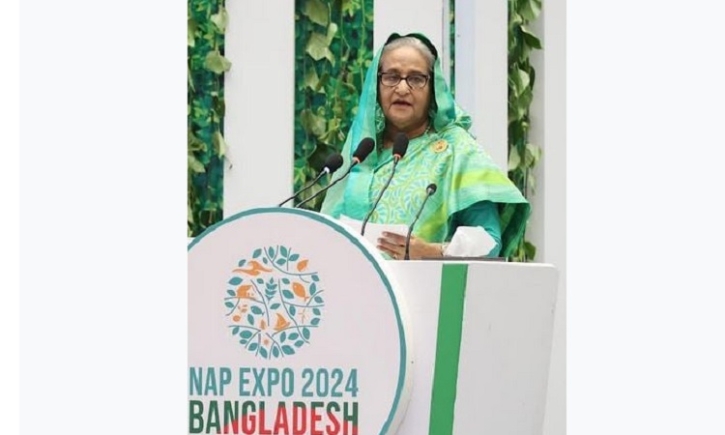
Photo: Collected
Prime Minister Sheikh Hasina on Monday stressed the need for expending money used in the war to protect the world, placing six proposals in facing the adverse impact of the climate change to build a beautiful world for future generation.
"I could not but saying one thing that the world could be saved if the money expended in the wars and buying weapons is used for (facing impacts of) climate change," she said, reports BSS.
The premier made the remarks while inaugurating a four-day UN Climate Adaptation Conference titled 'National Adaptation Plan (NAP) Expo 2024' and Bangladesh Climate Development Partnership (BCDP) at the Bangabandhu International Conference Centre (BICC) here.
"We aim to build a safe and beautiful world for future generations. Achieving this goal requires increasing adaptive capacity, strengthening resilience, and undertaking coordinated risk reduction initiatives. ---Let's work together to protect this planet more intensively," she said.
She also said she would like to briefly raise a few points for your consideration to build a beautiful world for the future generations.
In her first proposal, the premier said that major carbon-emitting countries must take effective action to reduce their emissions to limit global temperature rise to within 1.5 degrees Celsius.
"Second, commitments by developed countries to an annual climate fund of $100 billion must be met. This fund must be equally distributed between adaptation and mitigation," she said.
Thirdly, the premier said the developed countries must ensure efficient energy solutions and the transfer of technologies to developing countries.
In her fourth proposal, she also said during the transition to renewable energy, the development priorities of the countries involved should be taken into account based on their loss and damage.
Sheikh Hasina fifthly said all countries must share the responsibility for the rehabilitation of people displaced by sea-level rise, salinity, river erosion, floods, and droughts.
"Finally, major economies must work globally in partnership with all stakeholders to ensure a sustainable future for generations to come," she said.
The prime minister said Bangladesh has always been working with the international community to combat the impacts of climate change.
Under the leadership of the Prime Minister's office, Bangladesh has already formed the "Bangladesh Climate Development Partnership (BCDP)" with development partners, she said.
"All parties have agreed on this. I hope BCDP will significantly contribute to implementing the Mujib Climate Prosperity Plan, National Adaptation Plan, National Determined Contribution, and Vision 2041 of Bangladesh," she added.
Sheikh Hasina said Bangladesh has already formulated the National Adaptation Plan (NAP) for 2022-2050 and submitted it to the UNFCCC in October 2022.
In this plan, 113 priority programs have been identified in 8 sectors of 11 climate risk areas, she said.
"We need approximately 230 billion US dollars to implement the action plans adopted in the NAP over the next 27 years. I urge the rich countries and the international community to provide specific funds and additional financial resources," she said.
Environment, Forest and Climate Change Minister Saber Hossain Chowdhury, Executive Secretary of the United Nations Framework Convention on Climate Change (UNFCCC) Simon Stiell, Secretary of Environment, Forest and Climate Change Dr. Farhina Ahmed and UN Resident Coordinator in Bangladesh Gwyn Lewis, among other, spoke at the function.
Sheikh Hasina said the developed countries are contributing more to global warming through massive carbon emissions.
"It is their moral responsibility to protect the people affected by climate change," she said.
During Bangladesh's tenure as the chair of the Climate Vulnerable Forum (CVF), she said they repeatedly called for implementing the pledge of providing $100 billion per year by developed countries for adaptation and mitigation activities.
"I hope the developed countries will abide by their promises," she said.
The premier also urged the international community and wealthy nations to continue providing financial, scientific, and technical assistance to Bangladesh and other countries facing threats from the adverse impacts of climate change, even after graduation to developing countries.
According to the COP-26 decision, she said developed countries should double their adaptation financing by 2025 compared to 2019.
"I urge rich countries to fulfill this commitment," she said.
Sheikh Hasina said it should be ensured that countries that have already formulated NAPs can easily and quickly access financial support from all available sources, including the UNFCCC, to implement their NAPs.
"We are taking appropriate actions in adaptation and mitigation to reduce the potential damage caused by climate change. In this case, Bangladesh will take the necessary initiatives to access funding from the UNFCCC's Loss and Damage Fund," she said.
Although Bangladesh's contribution to global carbon emissions is less than 0.48 percent, she said it is one of the most affected and vulnerable countries to its negative impact.
"These adverse effects of climate change threaten our potential development and economic prosperity," she said.
The premier said continued global warming is raising sea levels and temperature.
"As a result, a large swath of southwestern Bangladesh, which comprises about 12-17% of the country's total area, is at risk of submergence by the end of this century," she said.
She also said they have made the call to the developed world to limit global temperature rise to 1.5oC.
In 2015, she said that Bangladesh formulated the Intended Nationally Determined Contribution (INDC) to reduce greenhouse gas emissions and submitted it to the UNFCCC in 2021 after updating.
"In the document, we set an unconditional 6.73% and a conditional 15.12% greenhouse gas emission reduction target", the premier said.
"In Bangladesh, we have reduced the use of fossil fuels and increased the use of renewable energy to reduce greenhouse gas emissions," she said.
So far, approximately 6 million solar home systems have been installed, and more than 4.5 million improved stoves have been distributed in rural areas, she added.
In 2023, Sheikh Hasina said they formulated the Mujib Climate Prosperity Plan (MCPP), which aims to reach from vulnerability to resilience to prosperity while combating the adverse impacts of climate change.
Besides, in the adaptation and mitigation programs of the MCPP, emphasis has been laid on the spontaneous participation of local people and stakeholders and nature-based solutions, she said.
The premier said following Father of the Nation Bangabandhu Sheik Mujib's footsteps, they have been implementing various programs using resources to fight against the adverse effects of climate change.
"In 2009, we established the 'Bangladesh Climate Change Trust Fund' with our funding to implement adaptation programs. Under this initiative, 969 projects costing about 500 million dollars have been undertaken," she said.
In the fiscal year 2023-24, she said that they are implementing projects in areas of coastal dams, cyclone shelters, coastal afforestation, etc., under 25 ministries for 37 thousand crore taka.
The catastrophic cyclone and tidal surge in 1970 killed nearly 500,000 people while 1991 cyclone killed 2 lakh people in Bangladesh, she said.
Mentioning that in 2023, there was no loss of life in the cyclone Mocha, she said, "This manifests Bangladesh's capacity for climate change adaptation and disaster risk reduction."
In the last 15 years, she said they have created 89,853 hectares of coastal forest through plantations, spreading over an area of about 127,548 hectares of hill and sal forest.
Additionally, she said they have formulated the Social Forestry Rules 2010 (Amended), involving local communities in the process.
"We have constructed the world's largest shelter project, the 'Khurushkul Special Shelter Project,' for climate refugee families in Cox's Bazar district. Under this initiative, we aim to rehabilitate 4,409 climate refugee families by constructing 139 multi-story buildings," she said.
Besides, the prime minister said they have provided houses with land to climate refugees and landless due to natural calamities free of costs, homeless people, and other socially backward communities, and provided them with education, health, and employment opportunities.
"So far, we have rehabilitated around 42 lakh people," she added.
An initiative to share best practices has been undertaken through the South Asia Regional Office of the Global Center on Adaptation in Dhaka, the premier continued.


